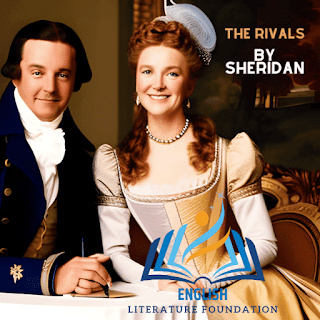Summary of "The Rivals" by Sheridan: A Classic Tale of Love and
Deception
"The Rivals" by Richard Brinsley Sheridan is a
timeless play that has captivated audiences for over two centuries. This
classic tale of love, deception, and mistaken identity takes place in 18th
century Bath, England. The story follows the romantic entanglements of several
characters, including Lydia Languish, a young and wealthy heiress, and Captain
Jack Absolute, a dashing soldier in disguise. The play is known for its witty
dialogue, humorous situations, and memorable characters. In this article, we
will provide a complete summary of "The Rivals" by Sheridan, with
quotes from the characters in between the text.
Characters
- Captain
Jack Absolute (Ensign Beverly): The protagonist, a charming and clever
young man in love with Lydia Languish.
- Lydia
Languish: A wealthy and romantic young woman who is obsessed with the idea
of eloping with a poor man.
- Mrs.
Malaprop: Lydia's guardian, a woman who frequently misuses words and
phrases, leading to humorous misunderstandings.
- Sir
Anthony Absolute: Jack's father, a wealthy man who disapproves of his
son's romantic pursuits.
- Sir
Lucius O'Trigger: An Irishman who is also pursuing Lydia's affections.
- Faulkland:
Julia's lover, a jealous man who constantly tests her love for him.
- Julia:
Faulkland's lover, a woman who is constantly tested by Faulkland's
jealousy.
Themes
- Love
and deception: The play explores the various ways in which the characters
deceive each other in the pursuit of love, and the consequences of those
deceptions.
- Social
class: The characters' social status and wealth play a significant role in
their romantic pursuits and the obstacles they face.
- Gender
roles: The play highlights the expectations placed on men and women in
courtship and marriage, and the absurdities that can arise from those
expectations.
Introduction to "The Rivals"
"The Rivals" was first performed in 1775 at the
Covent Garden Theatre in London. The play was an immediate success and has
since become a classic of English literature. It is a comedy of manners that
satirizes the social conventions of the time, particularly the hypocrisy and
vanity of the upper classes. The play is set in the fashionable resort town of
Bath, which was a popular destination for the wealthy and fashionable in the
18th century.
Act 1: The Introduction of the Characters
As the curtain rises, the audience is introduced to the
proud and wealthy Sir Anthony Absolute, who is discussing his son's future with
his friend, Fag. Sir Anthony is determined that his son, Captain Jack Absolute,
should marry for money and social status. Fag suggests a suitable match, but
Sir Anthony is dismissive, saying "I tell you, Fag, I have already chosen
my son's wife: Miss Lydia Languish."
Captain Absolute, however, is in love with Lydia, who is
young, naive and obsessed with the romantic ideals of novels and poetry.
Captain Absolute assumes the disguise of a poor and penniless officer named
Ensign Beverly, so as not to appear mercenary to Lydia. When Fag questions the
wisdom of the deception, Captain Absolute responds with a confident retort,
"It is impossible to argue with one who has such teeth!"
Lydia's aunt, Mrs. Malaprop, is a comic character who
frequently misuses words and phrases, creating humorous misunderstandings. She
is determined to find a wealthy husband for Lydia and disapproves of Ensign
Beverly. "She's as headstrong as an allegory on the banks of the
Nile!" exclaims Mrs. Malaprop.
Another character, Sir Lucius O'Trigger, an Irishman who is
in love with Lydia's maid, Lucy, also makes his entrance. Sir Lucius is
initially skeptical of Ensign Beverly's credentials, but is eventually won over
by his supposed poverty. "Pooh, pooh! I'll not be fooled by the disguise
of a poor spirit! Love is the only fire that is hot enough to melt the icicles
of prudence!" he declares.
Act 2: The Deception Continues
In Act 2, Captain Absolute continues his deception as Ensign
Beverly and woos Lydia with his romantic and poetic speeches. Lydia is smitten
with Ensign Beverly and believes him to be poor and penniless. "I would
have him know that I can be as romantic as anybody, since the novelists have
thought proper to ascribe that quality to my sex," she declares to Mrs.
Malaprop.
Meanwhile, Captain Absolute's friend, Faulkland, is engaged
to Julia, a young woman who is friends with Lydia. Faulkland is insecure and
jealous, constantly testing Julia's love for him and causing her distress.
"I am conscious of my own defects, and think anything is better than
conscious inferiority," he says.
Act 3: The Mistaken Identity Unfolds
In Act 3, the mistaken identity begins to unravel. Lydia's
cousin, Acres, has hired Sir Lucius O'Trigger to be his second in a duel with
Captain Absolute, who he believes is his rival for Lydia's affections. Sir
Lucius delivers a challenge to Ensign Beverly, who is actually Captain Absolute
in disguise. Captain Absolute accepts the challenge, but plans to use the duel
as a way to reveal his true identity to Lydia.
As the duel approaches, Acres becomes increasingly nervous.
"I have heard that men of desperate fortunes have sometimes been bought
over to betray their country, but I never expected to see a man of his
honourable connections and character, in the capacity of an assassin!" he
exclaims. Sir Lucius, however, remains determined to see the duel through.
"There is nothing like having a good name; no, no, a good name is better
than a good face," he declares.
Act 4: The Resolution of the Story
In Act 4, the plot is resolved. Captain Absolute reveals his
true identity to Lydia and she forgives him for his deception. Faulkland
realizes that he has been causing unnecessary distress to Julia and apologizes
to her. Mrs. Malaprop's attempts to meddle in the affairs of others are exposed
when her letters, filled with malapropisms, are read aloud. Acres is relieved
to discover that his rival was actually Captain Absolute in disguise and no
harm was done in the duel.
The play concludes with Sir Anthony reluctantly agreeing to
Captain Absolute's marriage to Lydia, who he now accepts as a suitable match.
"Well, well, we'll not talk about that now: but give me your hand, Jack;
you take after your mother, but talk like me: an honest heart and a good
humoured tongue are the most valuable things we can boast of," he says.
Conclusion
The Rivals by Sheridan is a classic play that explores the
themes of deception, love, and social status. The characters are humorous and
flawed, making for an entertaining and engaging story. The play is a satirical
commentary on the societal norms and expectations of the time, particularly the
emphasis on wealth and status in marriage. Despite the comedic elements, the
play also touches on deeper themes of love, trust, and forgiveness. It is a
timeless classic that continues to entertain audiences to this day.
FAQs
- What
is The Rivals by Sheridan about?
- The
Rivals by Sheridan is a play about deception, love, and social status. It
explores the societal norms and expectations of the time, particularly the
emphasis on wealth and status in marriage.
- Who
are the main characters in The Rivals by Sheridan?
- The
main characters in The Rivals by Sheridan include Sir Anthony Absolute,
Captain Jack Absolute, Lydia Languish, Mrs. Malaprop, Sir Lucius
O'Trigger, and Faulkland.
- What
is the significance of the character Mrs. Malaprop?
- Mrs.
Malaprop is a comic character who frequently misuses words and phrases,
creating humorous misunderstandings. Her character is significant in the
play as she represents the societal expectation of women to be
well-educated and cultured, while also being flawed and comedic.
- What
are the themes of The Rivals by Sheridan?
- The
themes of The Rivals by Sheridan include deception, love, social status,
and societal norms and expectations.
- Why is
The Rivals by Sheridan a classic play?
- The
Rivals by Sheridan is a classic play because of its enduring popularity
and relevance. It explores universal themes that are still relevant today
and is known for its witty and engaging dialogue.

